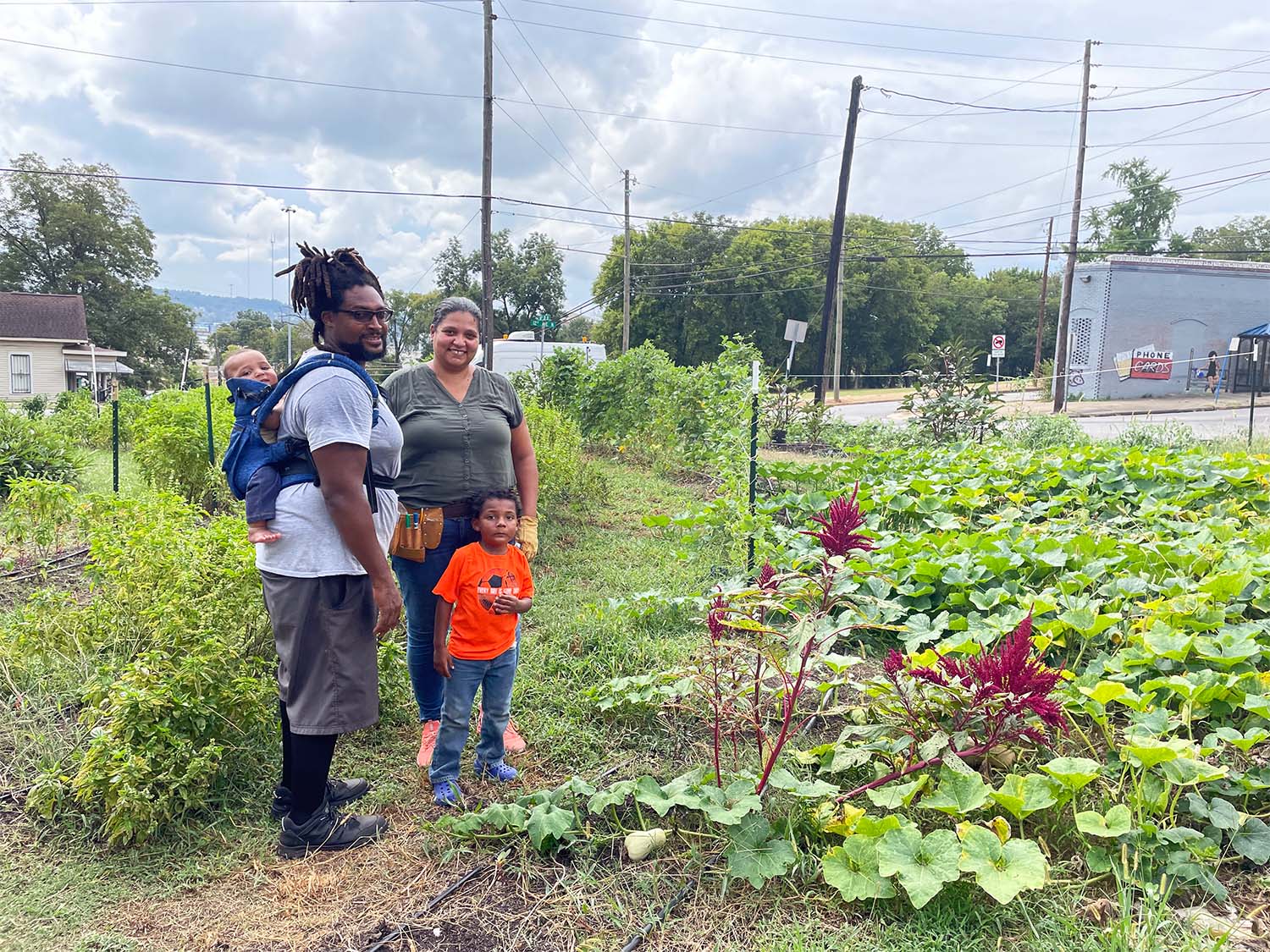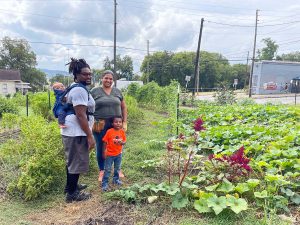M. Dominique Villanueva is a dedicated mother, neighbor, and farmer.
“I do a little bit of everything, but I call myself a farmer,” said Dominique.
She is used to wearing many hats and stepping up into different roles as needed. Her first role each day is as a dutiful mother, preparing her children for school each morning before strapping her child into her backpack and tending to her farm. There’s a surfeit of tasks to be done depending on the day, whether it be harvesting crops, planting new seeds, or replenishing the free farmstand on the edge of the property. The abundance of crops on Dominique’s farms includes carrots, efo shoko (Nigerian spinach), hibiscus, collard greens, bok choy (Chinese cabbage), and various beans and herbs.
Dominique decides which crops to grow on her farm by picking high-value crops that can generate income for her neighbors. She also selects crops to reintroduce people to their heritage and traditional foods that have been stripped from them. Dominique uses her farm to educate, provide, and nurture the culture around her community in an enriching way rarely seen in urban spaces.
Dominique co-founded Fountain Heights Farms (FHF)alongside her husband. She reminisces on the early days of starting her farm to create a family budget to save up for a home.
- Dominique Villanueva
- Christopher Gooden
Dominique has a background in teaching and, in 2008, was looking to build a home for her family. The plan to make this home a reality was to create a substantial budget and cut the rising cost of groceries by growing and cooking food with a nutritional focus. Dominique and her family were able to save enough money to buy a home in Fountain Heights and continued to grow their food.
The abundant harvest the family accumulated attracted neighbors and people passing by to stop and reminisce about their childhood, growing up in the rural sun, and their gardens. Feeling accomplished and compelled, Dominique began donating her harvests and seeds to feed her neighbors and generate extra income by teaching them to grow and sell high-value crops. Their success allowed them to acquire four lots in the Fountain Heights area to produce more food and officially develop Fountain Heights Farms.
Dominique uses farming to provide for her family and feed her neighbors physically and intellectually. FHF educates others about the benefits of healthy, fresh food and advocates for BIPOC land ownership and land justice while creating educational spaces for people to connect and find joy in nature.
“I’ve never lived in a place where I felt so close to my neighbors,” said Dominique.
“We’ve built the type of relationships where people know my children and look out for them; People feel comfortable to share deeply personal things in their lives or to be able to share the work that the farm is. It’s very humbling to be able to build those kinds of relationships.”
The relationships that FHF has produced drive Dominique to keep going even when faced with hardship. The Fountain Heights community is a predominantly black area after racist redlining practices. In the past ten years, development has begun to revamp downtown Birmingham and gentrification has crept into surrounding neighborhoods. While progress and improvement are welcome in the community, displacing residents by pricing them out of the area is not.
“There’s a lot of investments and speculation going on. That has happened after decades of redlining, racism, lending, and insuring,” said Dominique. “Ways that have stripped [primarily] black people that live in Fountain Heights of their wealth.”
Roadblocks like this make it harder for FHF to continue to expand and buy more farming lots within the community. Less farming lots mean less harvest, which only sometimes fall within Dominique’s production goals of consistently producing more.
“Developers have decided that this is the new and upcoming area, so they purchased many empty lots that used to be available for farming,” said Dominique.”When I look around and see that, I think I could have grown 50,000 or 30,000 [lbs of produce].”
Other hardships FHF has faced include the impact of the COVID-19 pandemic, including battling COVID-19 within her household and setting back production for FHF. During this time, Dominique said she was thankful for her neighbors and volunteers to come out and collect the harvest from their lots. Dominique also reminisced about shortages within the Fountain Heights community at local stores.
“The stores were empty. We already had a limited stock of essential needs. Still, when the pandemic hit, there was nothing left,” said Dominique.
FHF wanted to ensure everyone in the community was cared for. Dominique said the pandemic helped her see the urgency to teach others how to grow their food and create a community that can band together whenever faced with uncertainty.
“I hope Fountain Heights Farms and our work move my neighbors closer to food sovereignty. To be able to make the choices they want for fresh food, as well as control the type of access they have [to it],” said Dominique.
She said that although freeways interlock Fountain Heights, there is more to the area than houses and development.
“Fountain Heights includes the civil rights district, it includes the historically Black Bussiness District, and it goes all the way down to the bus stations and Morris Avenue,” Said Dominique. “We are a diverse neighborhood that could be benefiting by sharing the resources we each have through reinvestments and people who are willing to listen.”
FHF listens to the community’s issues by developing multiple programs to provide food for community members. One of the programs Dominque is most proud of is FHF’s Aquaponics Learning Center.
“Aquaponics is a closed-loop system that doesn’t require people to plant in the ground,” said Dominique.
These programs benefit communities like theirs that may be affected by pollution, which can make it unsafe to eat food grown on contaminated soil. FHF also sells seedlings to offset the cost of running a farm to guests hoping to support local black farmers. Each week FHF sets up a farmstand at the edge of their main property and allows guests to pick up any products they need for free. They also dedicate their farms to teaching others how to grow food in the event of food shortages should the issue arise. Some educational sessions FHF holds target the elderly and young community members to encourage them to acquire skills needed to incorporate farming in their future and survival. Volunteers and FHF staff, including Dominique’s family, often lead these sessions, but extra hands are always welcome.
Dominique said the thing FHF needs most is help. She said they would only be able to provide as much as they do with volunteers, but the goal is always to produce more. Because FHF is a nonprofit and family-led organization, Dominique has grown accustomed to stepping up to ensure the farms are always in peak condition as well as the FHF organization as a whole. She said the nobility of being a farmer often supersedes the struggle behind the scenes. She wishes that as FHF continues to grow, support for her efforts grows just as quickly.
“We need to be supported at the same rate that other organizations are,” said Dominique. “There’s no executive director of other farming organizations in Birmingham that’s doing their own social media management, or farming with their children on their back, that’s doing grant writing, and also the day-to-day accounting.”
Although commended for her strength and selfless efforts, Dominique said the downside to this is having people think she can do it all without any help.
“People look and think, ‘oh, a black woman. You can do everything!’ But that wouldn’t be the case if I was anyone else. The truth is, I do need the help,” said Dominique.
Her vision for the future of FHF is to find a model that allows people to lend their skills without relying solely on free labor or overexerting one person with many tasks. Instead, she wants to enable people to step into roles that mutually benefit themselves and the farms. She also hopes to acquire more land to farm and harvest produce, giving people better control over their nutritional resources. Dominique hopes to move away from the fear of food scarcity and into a mindset of food abundance based on a plethora of resources and skills already acquired from educational resources like FHF.
The best way to support Fountain Heights Farms is to lend a hand. FHF has many roles to be filled and can be found by following their social media pages like FacebookorInstagram. Also, check their website for upcoming events, subscription programs, and how to plan your visit to the farm and learn to grow or work for FHF.






